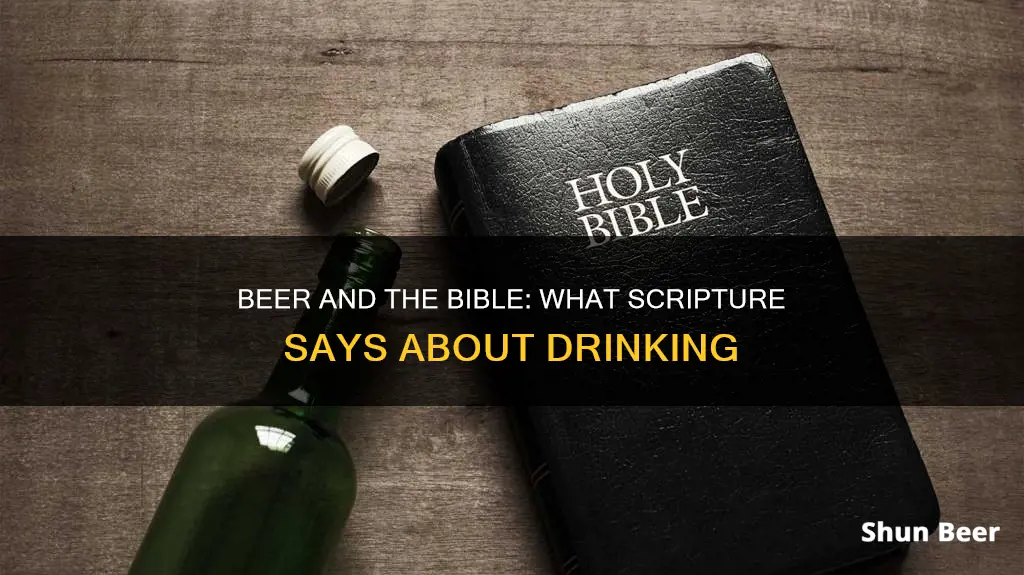
The Bible has a lot to say about alcohol, and beer is no exception. While some Christians believe in abstinence, others think it's okay to enjoy a drink now and then. So, what does the Bible say about drinking beer specifically? Well, it's a bit of a mixed bag. On the one hand, the Bible never explicitly forbids drinking beer, and even mentions it in a few places. On the other hand, it cautions against drunkenness and excessive drinking, which can lead to trouble. So, what's a Christian to do? Let's take a closer look and find out.
| Characteristics | Values |
|---|---|
| Bible's view on drinking beer | Drinking beer is not considered a sin, but drunkenness is |
| Bible verses about drinking beer | Philippians 4:5, Romans 12:1-2, Proverbs 20:1, 31:4-8, Isaiah 5:9-12, 1 Peter 5:7-8, Ecclesiastes 9:5-7, Ephesians 5:16-18, Romans 13:13-14, Galatians 5:19-21, 1 Corinthians 6:8-11, 6:12, 10:31, Colossians 3:17, 1 Samuel 1:13-17, Isaiah 56:10-12, 24:9-12, Micah 2:8-11 |
| Bible's advice on drinking beer | Drink in moderation, be careful not to cause others to stumble and fall into sin |
What You'll Learn

The Bible does not forbid drinking beer
However, the Bible warns against drunkenness, which can cloud judgement and lead to harmful behaviour. Ephesians 5:18 says: "Do not get drunk on wine, which leads to debauchery. Instead, be filled with the Spirit". Drunkenness is sinful, and it is this, rather than alcohol itself, that will lead people to hell.
The Bible also warns against causing others to stumble, or encouraging them to sin against their conscience. It would be difficult for a Christian to say they are drinking alcohol to the glory of God.
Jesus drank wine, and turned water into wine. In 1 Timothy 5:23, Paul instructed Timothy to stop drinking water exclusively and instead drink wine, which was less likely to be contaminated.
In summary, the Bible does not forbid drinking beer, but Christians are warned against drunkenness and causing others to sin.
Beer Overdose: Kidney Stones and Health Risks
You may want to see also

Drunkenness is a sin
The Bible does not forbid Christians from drinking beer, wine, or any other alcoholic drink. In fact, some passages in the Bible refer to alcohol in a positive light. For example, Ecclesiastes 9:7 says, "Drink your wine with a merry heart." Similarly, Psalm 104:14-15 states that God gives wine "that makes glad the heart of men."
However, drunkenness is considered a sin in the Bible. Ephesians 5:18 warns against getting drunk, stating, "Do not get drunk on wine, which leads to debauchery. Instead, be filled with the Spirit." The Bible also associates drunkenness with negative consequences, such as clouded judgment, harmful behavior, and trouble.
Christians are encouraged to be mindful of their impact on others and to avoid causing anyone to stumble into sin. This includes refraining from excessive drinking, as it can lead to addiction and negatively impact others.
The Bible offers numerous warnings against drunkenness and encourages Christians to be guided by the Spirit rather than substances. It is important for Christians to reflect on whether alcohol enhances their spiritual life and to make decisions that align with their values and beliefs.
Should Your Pitbull Drink Beer?
You may want to see also

Alcohol is not inherently sinful
The Bible does not condemn alcohol consumption but rather warns against drunkenness and the dangers associated with it. In fact, Scripture presents a nuanced and balanced approach to the topic of alcohol. Several passages in the Bible mention alcohol in a positive light, indicating that it can be enjoyed as a gift from God when used wisely and in moderation. For instance, Deuteronomy 14:26 encourages the enjoyment of "the fruit of the vine," which likely refers to wine, as a blessing from God. Similarly, Psalm 104:14-15 praises God for providing humans with "wine to gladden the heart," suggesting that alcohol can be a source of joy and celebration when used appropriately.
The key biblical principle regarding alcohol is self-control and moderation. Passages like 1 Corinthians 6:12 and Titus 1:7-8 emphasize that while Christians have freedom in Christ, they should not let anything control them or become a master over them. This includes alcohol. Believers are called to exercise self-control and ensure that their drinking does not lead to drunkenness, disorderly conduct, or any other behavior that would bring disrepute to the name of Christ.
Additionally, the Bible presents alcohol as having legitimate and beneficial purposes. Proverbs 31:6-7, for example, suggests that strong drink can be given to those who are perishing or in anguish to "forget their poverty and remember their misery no more." This indicates that alcohol can serve a medicinal or palliative purpose, bringing comfort and relief in difficult circumstances. Similarly, Jesus' first miracle involved turning water into wine at a wedding feast (John 2:1-11), demonstrating that alcohol can be used to facilitate celebration and joy in appropriate social contexts.
Furthermore, the Bible provides guidelines for wise and prudent alcohol consumption. Passages like Ephesians 5:18 and 1 Timothy 3:2-3 caution against excessive drinking and encourage moderation. Believers are instructed to be filled with the Spirit, resulting in joyful praise and thanksgiving rather than drunkenness. This reflects a broader biblical theme of self-control and discipline, ensuring that one's actions do not bring harm to oneself or others.
In conclusion, while the Bible clearly condemns drunkenness and the abuses associated with alcohol, it does not prohibit the responsible consumption of alcoholic beverages. Christians are called to exercise wisdom, moderation, and self-control in their drinking habits, recognizing that alcohol can be enjoyed as a gift from God when used appropriately. This balanced approach reflects a thoughtful and nuanced biblical perspective on the topic.
Druids and Beer: A Magical Brew
You may want to see also

Drinking in moderation is advised
The Bible does not forbid Christians from drinking beer, wine, or other alcoholic drinks. However, it is important to emphasise that moderation is advised.
The Bible contains several passages that discuss alcohol positively. For example, Ecclesiastes 9:7 instructs believers to "Drink your wine with a merry heart", and Psalm 104:14-15 states that God gives wine "that makes glad the heart of men". Additionally, Amos 9:14 describes drinking wine from your vineyard as a sign of God's blessing, and Isaiah 55:1 encourages believers to "buy wine and milk".
However, the Bible also contains warnings about the dangers of alcohol consumption. Drunkenness is explicitly condemned in Scripture, with passages such as Ephesians 5:18 instructing believers to "not get drunk on wine, which leads to debauchery. Instead, be filled with the Spirit". The Bible also cautions against the addictive nature of alcohol and the potential for it to lead to excess. Christians are encouraged to avoid anything that might offend other Christians or encourage them to sin, and to refrain from anything that might master them (1 Corinthians 6:12; 2 Peter 2:19).
Therefore, while the Bible does not prohibit alcohol consumption outright, it is clear that drinking in moderation is advised. Christians are called to exercise self-control and to prioritise their spiritual life and the well-being of their fellow believers.
The Art of Drinking Beer: A Beginner's Guide
You may want to see also

Drinking is a personal choice
Drinking beer or any alcoholic beverage is a personal choice. While some Christians believe in complete abstinence, the Bible does not explicitly forbid drinking alcohol. Instead, it warns against drunkenness and its effects, which are considered sinful.
The Bible contains several passages that discuss alcohol, and even mentions it being part of heaven. For example, Ecclesiastes 9:7 instructs: "Drink your wine with a merry heart." Similarly, Psalm 104:14-15 states that God gives wine "that makes glad the heart of men." These passages suggest that drinking in moderation is acceptable.
However, the Bible also includes warnings about the negative consequences of excessive drinking. For instance, Proverbs 20:1 states: "Wine is a mocker, beer is a brawler, and whoever staggers because of them is not wise." This verse cautions against the loss of wisdom and control that can occur when drinking alcohol.
Additionally, the Bible emphasizes the importance of not causing others to stumble or encouraging them to sin. Romans 14:21 highlights this concern: "It is good neither to eat flesh, nor to drink wine, nor any thing whereby thy brother stumbleth, or is offended, or is made weak." This verse suggests that even if drinking alcohol is not inherently sinful, it can become an issue if it causes another person to fall into sin.
Ultimately, the decision to drink beer or any alcoholic beverage is a personal choice for Christians. While the Bible does not forbid alcohol consumption, it is crucial to avoid drunkenness and to consider the potential impact on others.
Beer and Gas: Is There a Link?
You may want to see also
Frequently asked questions
The Bible does not forbid Christians from drinking beer, but it does command them to avoid drunkenness.
Yes, the Bible mentions drinking beer and wine in several passages, often in positive terms. For example, Ecclesiastes 9:7 says: "Drink your wine with a merry heart".
Yes, the Bible warns against drinking to excess, and the dangers of drunkenness. For example, Proverbs 20:1 says: "Wine is a mocker, beer is a brawler, and whoever staggers because of them is not wise".
Yes, the Bible recommends drinking in moderation. For example, Philippians 4:5 says: "Let your moderation be known unto all men".







